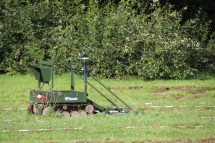Landmines
A land mine is an explosive device, concealed under or on the ground and designed to destroy or disable enemy targets as they pass over or near the device. Such devices are typically detonated automatically by way of pressure from the target stepping or driving on it, though other detonation mechanisms may be possible. The device may cause damage either by a direct blast or by fragments that are thrown by the blast.
The name originates from the ancient practice of military mining, where tunnels were dug under enemy fortifications or troop formations by sappers. These killing tunnels ("mines") were at first collapsed to destroy targets located above, but they were later filled with explosives and detonated in order to cause greater devastation.
Nowadays, in common parlance, land mines generally refer to devices specifically manufactured as anti-personnel or anti-vehicle weapons. Though many types of improvised explosive devices ("IEDs") can technically be classified as land mines, the term land mine is typically reserved for manufactured devices designed to be used by recognized military services, whereas IED is used for makeshift devices assembled by paramilitary or terrorist groups.
The use of land mines is controversial because of their potential as indiscriminate weapons. They can remain dangerous many years after a conflict has ended, harming the economy and citizens of many developing nations. With pressure from a number of campaign groups organised through the International Campaign to Ban Landmines, a global movement to prohibit their use led to the 1997 Convention on the Prohibition of the Use, Stockpiling, Production and Transfer of Anti-Personnel Mines and on their Destruction. As of 2011, a total of 158 nations have signed the Ottawa treaty.




